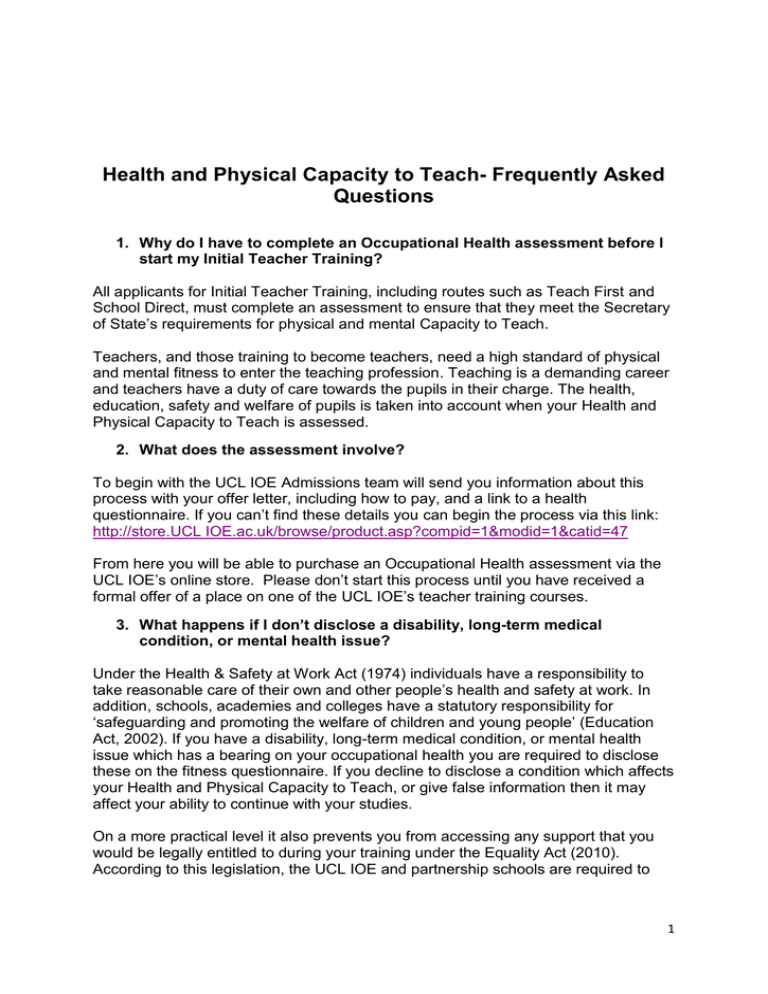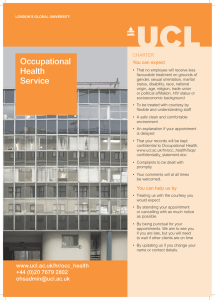Health and Physical Capacity to Teach- Frequently Asked Questions
advertisement

Health and Physical Capacity to Teach- Frequently Asked Questions 1. Why do I have to complete an Occupational Health assessment before I start my Initial Teacher Training? All applicants for Initial Teacher Training, including routes such as Teach First and School Direct, must complete an assessment to ensure that they meet the Secretary of State’s requirements for physical and mental Capacity to Teach. Teachers, and those training to become teachers, need a high standard of physical and mental fitness to enter the teaching profession. Teaching is a demanding career and teachers have a duty of care towards the pupils in their charge. The health, education, safety and welfare of pupils is taken into account when your Health and Physical Capacity to Teach is assessed. 2. What does the assessment involve? To begin with the UCL IOE Admissions team will send you information about this process with your offer letter, including how to pay, and a link to a health questionnaire. If you can’t find these details you can begin the process via this link: http://store.UCL IOE.ac.uk/browse/product.asp?compid=1&modid=1&catid=47 From here you will be able to purchase an Occupational Health assessment via the UCL IOE’s online store. Please don’t start this process until you have received a formal offer of a place on one of the UCL IOE’s teacher training courses. 3. What happens if I don’t disclose a disability, long-term medical condition, or mental health issue? Under the Health & Safety at Work Act (1974) individuals have a responsibility to take reasonable care of their own and other people’s health and safety at work. In addition, schools, academies and colleges have a statutory responsibility for ‘safeguarding and promoting the welfare of children and young people’ (Education Act, 2002). If you have a disability, long-term medical condition, or mental health issue which has a bearing on your occupational health you are required to disclose these on the fitness questionnaire. If you decline to disclose a condition which affects your Health and Physical Capacity to Teach, or give false information then it may affect your ability to continue with your studies. On a more practical level it also prevents you from accessing any support that you would be legally entitled to during your training under the Equality Act (2010). According to this legislation, the UCL IOE and partnership schools are required to 1 make reasonable adjustments to support any student disclosing a disability, long term medical condition, or mental health issue. 4. Who gets my information? Your answers are confidential and your completed questionnaire is sent to Health Management. They are the UK’s leading Occupational Healthcare provider and are employed by the UCL IOE to carry out Occupational Health assessments for all students on our Initial Teacher Training courses. You should complete the health questionnaire as fully and honestly as possible. Health Management may ask you to provide further information about some of your answers if they feel it is relevant. 5. What happens next? Once the assessment process is complete you will receive an email from the UCL IOE informing you of the outcome, which will fall into one of three groups: a. Fit to Teach: you are in good health and free from conditions that might be likely to interfere with efficiency in teaching. b. Fit to Teach with reasonable adjustments: you are in good health but have conditions which are likely to affect your ability to teach either all subjects, or certain specified subjects. However, these conditions are not serious enough to make you unfit for the teaching profession. This includes some disabled people who need reasonable adjustments to enable them to provide effective and efficient teaching. c. Unfit to Teach: your condition makes you unfit for the teaching profession. You will not normally be included in this category unless you have a condition likely to interfere seriously with regular and efficient teaching of either general subjects, or the subject you intend to specialise in (e.g. P.E. or science subjects), or you have a condition that may carry a risk to the safety or welfare of the pupils. 6. What happens if I disclose a disability, long-term medical condition, or mental health issue? If you have a disability, medical condition, or mental health issue then it’s likely that Health Management will request that you meet with one of their doctors for a face-toface appointment before making a final judgment on your Health and Physical Capacity to Teach. This is an opportunity to identify any areas of the course where you may need support or reasonable adjustments. On some occasions Health Management may seek further information from your GP or specialist to clarify matters further. If any need for support or reasonable adjustments is identified as part of your Occupational Health assessment, you need to contact Student Disability Services at the UCL IOE in order to discuss how this can be implemented during your studies. 2 Health Management staff have no direct role in arranging practical support at the UCL IOE or on placement; these adjustments can only be made through Student Disability Services. 7. What happens if I don’t complete my Occupational Health Assessment? The UCL IOE must receive confirmation that you have filled in your Occupational Health Assessment before enrolment. You will not be able to enrol until you have done this. You must complete the Occupational Health form prior to starting your first placement. The UCL IOE has a responsibility to partnership schools (and the children and young people attending those schools) that any students we send to them are Fit to Teach, or accessing appropriate reasonable adjustments to manage the impact of any disability, medical condition, or mental health issue on their teaching. 8. What kind of support can I access? The support you can access will depend on your individual circumstances, so you must liaise with Student Disability Services about your needs. Some examples of support provided for trainee teachers in the past are: Help with travel costs if you are unable to use public transport Assistive technology software Specialist ergonomic equipment Sessions with one-to-one study skills support tutors or specialist mentors 9. What if my health circumstances change during my period of study? If there is a change in your health after you complete your Occupational Health assessment (e.g. you are diagnosed with a long-term serious medical condition), then you should contact Student Disability Services for guidance. It is likely that you will be re-referred to Health Management for a further Occupational Health assessment, which will enable us to advise and support you based on your new circumstances. 10. Are there any conditions which will automatically prevent me from pursuing my Initial Teacher Training? There is no specific list of conditions incompatible with teaching. If you have concerns then you can discuss them anonymously over the phone with Student Disability Services, or at a confidential 1:1 appointment. 11. Will my school placement be informed about the outcome of my Occupational Health assessment? Not without your agreement. Under the Data Protection Act (1998), information about impairments is considered ‘sensitive information’, which means that it cannot be passed onto anyone else without explicit and informed consent. Candidates therefore have the right to ask that such information be treated as confidential. 3 UCL IOE staff will pass on information given ‘in confidence’ only if there is a significant identified risk to the candidate/trainee concerned, or to pupils or others. If you have been identified as Fit to Teach with reasonable adjustments, you should contact Student Disability Services at the UCL IOE to discuss the support we can offer you and decide whether disclosure to the placement school or college is essential. Student Disability Services can advise you on a disclosure plan. With your agreement a Summary of Reasonable Adjustments can be drawn up to outline support available at the UCL IOE. We can also address a section to the PCM (Professional Coordinating Mentor) at your school or college. This will outline suggestions for your support whilst on placement. It should be noted that some impairments must be disclosed to the school and that your ability to succeed at your placement may be compromised if you are unwilling to disclose and accept the reasonable adjustments offered. If you are found “Unfit to Teach” you will not be able to start your placement. Your course team and Student Disability Services will then work with you to decide whether you should withdraw from the course, defer or interrupt and undergo another Occupational Health assessment at a more appropriate time. Additional information Able to Teach: Guidance for Providers of Initial Teacher Training on Disability Discrimination and Health and Physical Capacity to Teach. Teacher Training Agency (2007) http://www.skill.org.uk/uploads/AbleToTeach2007.pdf Education Act (2002) http://www.legislation.gov.uk/ukpga/2002/32/contents Equality Act (2010) http://www.legislation.gov.uk/ukpga/2010/15/contents ITT criteria supporting advice July 2013 https://www.gov.uk/government/uploads/system/uploads/attachment_data/file/ 211218/ITT_criteria_supporting_advice.pdf Physical and Mental Health and Physical Capacity to Teach and of Entrants to Initial Teacher Training. Circular No: 4/99 Department of Education and Employment (DfEE) http://tna.europarchive.org/20070205142548/http:/www.dfes.gov.uk/publicatio ns/guidanceonthelaw/6_99/circa148.htm Contact us: Student Disability Services Registry & Student Support UCL Institute of Education 20 Bedford Way London WC1H 0AL Email: disabilityadmin@ioe.ac.uk Tel. 020 7612 6641 4 Document created by Student Disability Services, Student Support, Registry, Last updated Tuesday, 23 June 2015 5



